Parting the Ivy
By:
September 26, 2011
Educator, author, and pro-democracy activist Christopher Phillips will be at Porter Square Books tonight at 7 pm, supporting his new book, Constitution Cafe: Jefferson’s Brew for a True Revolution.
Back in May 2000, I wrote about Phillips and his Socrates Cafe project for the website FEED. Here’s that essay.
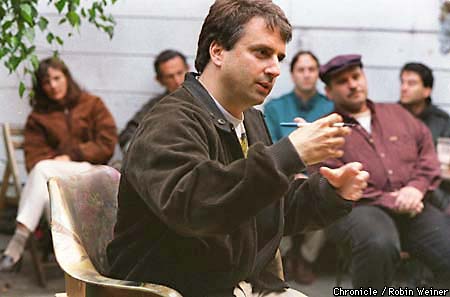
Chris Phillips used to be a journalist and photographer, a public school teacher, and a college instructor with three master’s degrees. Today, at forty, he’s underemployed, deeply in debt, and completely ecstatic about how his life has turned out. While studying for a master of arts in teaching at Montclair State University in 1996, Phillips chanced to pick up Existentialism from Dostoevsky to Sartre, the seminal collection of existentialist and proto-existentialist texts that Walter Kaufmann compiled in 1956 as a means of preparing humankind for a genuinely philosophical form of life. Something Phillips read in Kaufmann’s introduction to the book soon sent him rocketing across America, visiting jails, hospices, nursing homes, and other public venues — all on his own dime. “I didn’t have any master plan when I started doing this,” he told me recently. (I’d tracked him down in Baltimore, though he lives now in Scottsdale, Arizona.) “I just had this little idea: Let’s give philosophy back to the people.”
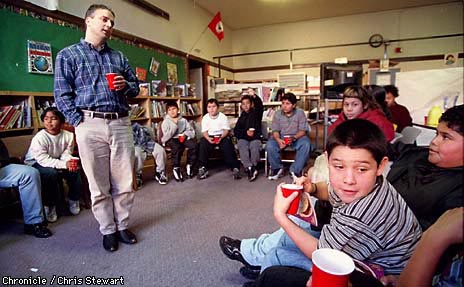
“More than anyone else who’s ever lived,” Phillips insists, “Socrates models for us philosophy in practice — philosophy as deed, as a way of living, as something that any of us can do. The Socratic method is a way to seek truths by your own lights; it is a system, a spirit, a method, a type of philosophical inquiry, an intellectual technique, all rolled into one.” Having decided to bring Socrates’ mordant, incisive methods of philosophical inquiry to ordinary men and women around the country, Phillips started what he calls the Socrates Café. By which he means a bunch of people getting together in a café or coffeehouse for a couple of hours and, with the help of a facilitator, applying the Socratic method to some question that troubles them: What is Truth? What is Justice? What is a Philosopher?
Phillips described such a meeting, and his method of conducting it, in an article he wrote for the literary magazine Troika. That particular evening the topic under discussion was “What is Insanity”
A statuesque woman with short purple hair who is wearing a purple Greenpeace T-shirt asks me, “What about Socrates? Was he sane?”
“What do you think?” I ask her.
“Well,” she replies, “when Socrates was tried and convicted of heresy for corrupting the youth of Athens, and his prosecutors hinted that if he’d agree to keep his mouth shut they wouldn’t put him to death, Socrates said he’d rather die than quit asking questions.”
“Was it crazy of him to prefer death?” I ask.
“Socrates said that the unexamined life isn’t worth living,” she says.
“So I guess for him it wasn’t crazy.”
“I think he was crazy,” says a somewhat disheveled man in sandals, a Hawaiian shirt, and a battered bowler completing a picture of sartorial strangeness. “But he was a good crazy. His craziness has been the guide for civilizations whenever they try to set themselves on a road of sanity.”
In that same article, Phillips questions his own sanity: “I think: Socrates is here tonight. Every time a new question is raised, every time a new perspective is offered, every time someone’s convictions are challenged, he is here. Crazy, huh?”
This kind of group effort, Phillips argues, is the best possible antidote to traditional philosophy lectures, which create a hierarchy of philosopher and student. He doesn’t charge for his services, because “it would be sacrilege to charge people when you learn much more from them than they could ever learn from you.” A Socrates Café is nontechnical, and though it may become erudite, the participants — including the ones who’ve never read a word of philosophy in their lives — can’t help but become expert at Phillips’ brand of philosophical inquiry. “A Socrates Café is a home for a lot of people who’ve never felt at home in academia, including academics,” Phillips explains. “It’s not in any way, shape or form anti-academic, but it does hopefully expand and broaden the range of inquiry, to the way philosophers used to be, when they would look at any and every question under the sun.”
In Plato’s early Dialogues, Socrates barrages people who seem overly sure of their beliefs with so many questions that they emerge from the discussion knowing that they don’t, in fact, know much of anything at all. Scholars call this method of instruction the elenchus, which is Hellenistic Greek for “examination.” But “an elenchus isn’t just any type of inquiry or examination,” Phillips cautions. “It’s a type of inquiry that reveals people to themselves, that makes them see what their own opinions really amount to.” Phillips, who publishes a newsletter entitled Elenchus (the contents are written by participants in Socrates Cafés), calls what he does “Socratizing.” The expression’s folksiness is, however, deceiving. Socratizing, Phillips says, is rewarding precisely because it’s so challenging. “The Socratic method challenges common sense itself,” he argues. “It scrutinizes whether what is taken to be the common sense of the day holds the greatest potential for self-understanding and human excellence, or whether the prevailing common sense is in fact a roadblock to realizing this potential and so should be disposed with.”
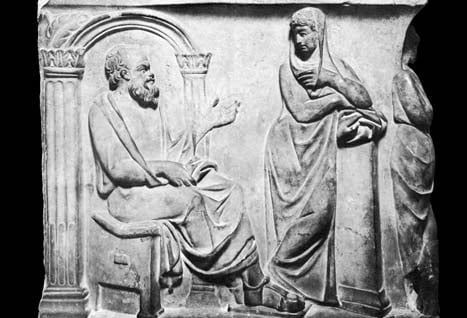
This kind of thing sounds positively uplifting, but as those who’ve used the Socratic method to challenge conventional wisdoms can attest, an elenchus can be a terrifying experience. In Søren Kierkegaard’s doctoral thesis The Concept of Irony, the father of Existentialism takes issue with the Greek historian Xenophon’s description of Socrates’ methods as “educational,” because, in fact, as he puts it, “Socrates grasps the pillars that support knowledge and tumbles everything down into the nothingness of ignorance.” (This explains why, in one of the dialogues, an interlocutor named Alcibiades exclaims tearfully, “What have you done to me, Socrates! I no longer know who I am!”) A Socratic elenchus, Kierkegaard warned, is an encounter with nothing less than “infinite absolute negativity”; every single remark Socrates made, he continued, gravitated toward “a spiritual condition that was infinitely bottomless.” Phillips agrees with Kierkegaard that the fulfillment that comes from Socratizing carries a hefty price. “It could well make us unhappier, more uncertain, more troubled,” he says. “It can leave us with a sense that we’re much further from knowing the answers to our questions than we were before we’d started.”
An elenchus isn’t entirely negative, however. Socrates believed that the awareness of one’s own ignorance ought to serve as spur to further inquiry. Which is exactly what Walter Kaufmann, the philosopher whose introduction Phillips found so inspiring, believed. Taking a cue from Nietzsche, that refugee from the ivory tower whose works Kaufmann translated and disseminated throughout the English-speaking world, the introduction ended in a challenge to future generations. “If philosophy is to have a future outside the academies,” Kaufmann wrote, we’ll need philosophers who, like Nietzsche and Socrates, are able to “think in tension” between the intellectual rigor of philosophical analysis and the human need to ask to “the big and interesting questions” about life as it’s lived. This was the challenge that Chris Phillips would accept forty years later — only Phillips has decided that everyone should be this kind of philosopher. Socrates had envisioned a republic ruled by philosophers. This is Phillips’s vision, too; only he calls it democracy. “We talk so much about the need for participatory democratic society, but, my God, that ain’t the way it is!” he says. “The Socrates Café is one very modest attempt to really make democracy more participatory, by giving every citizen the tools to make informed decisions. The aim is to create a more empathetic society of critical and empowered thinkers.”

“If you have about twenty folks, you’re almost guaranteed a real plurality of perspectives,” Phillips continues. “From the Platonic to the intuitionist, to the New Age, to the pagan, whatever, it’s so neat! To have all these people weighing in and not necessarily trying to win the day but trying to get their point across while you try to get your point across — there’s this wonderful tension! You sort of rotate and revolve around this conceptual ball that you’re just constantly plumbing and mining and examining for all it’s worth.” The website of the Society for Philosophical Inquiry (a nonprofit organization Phillips helped found in 1998) describes Phillips’ original Socrates Café as consisting of “so-called freethinkers and arch-individualists, the alienated and the disenfranchised, as well as the well-to-do and well-connected. Together they have formed a community comprised of people who usually don’t socialize, much less discuss the timeless ‘great ideas’ with one another.” What all the participants in a Socrates Café do have in common, the essay continues, “is an immense respect for one another’s point-of-view, an immense desire to put their convictions on the line and have them examined and scrutinized by others as compelling objections and alternatives are set forth, and an immense and enduring curiosity that cannot be quenched or satisfied by the facile responses of know-it-all gurus.”
I also asked Phillips if he’d ever tried Socratizing one-on-one, and he says that, indeed, the most memorable discussion he’s ever had was with just one other person. While still in Montclair, three weeks after his first-ever Socrates Café, he’d advertised another one but only one person showed up. “I was so depressed!” he recalls. “But we had this beautiful discussion on the question What is Love? and I ended up marrying her!”
Doing philosophy in the public square is an idea that predates even Socrates; but where did Phillips get the idea to bring the Socratic method to cafés in particular? He’d been exposed to the Socratic method, he says, by Matthew Lipman, a professor at Montclair (and, Phillips wants me to know, “the most extraordinary man” he’d ever met) who’d pioneered the idea of “philosophy for children” — encouraging schoolchildren to deliberate on topics that both they and traditional philosophers have been interested in. Kaufmann’s work made him determined to get the Socratic method out of the ivory tower. But how, exactly?
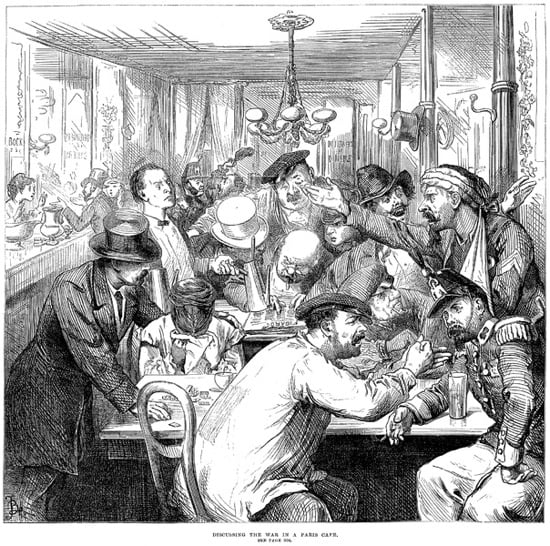
It was while Phillips was puzzling over this problem that he first heard about the “philosopher’s café” movement then making a splash in Paris. In 1992, a Parisian Nietzsche scholar named Marc Sautet decided that lecturing at the Institut de Sciences Politiques just wasn’t good enough, so he invited some friends to participate in a pugilats d’idées (“conceptual fisticuffs”) for two hours every morning at a sidewalk café on the Place de la Bastille. Within a few years, Sautet’s “café philosophique,” as French journalists mockingly called it (the abbreviated form ,”café-philo,” has since caught on) was overrun by Parisians of all sorts — from taxi drivers to bored sophisticates — united by a desire to Socratize. Dozens, then scores, of other cafés-philos rapidly appeared in and around Paris. To safeguard the freewheeling conversation’s intellectual rigor, Sautet (who died of a brain tumor in 1998) presided over his café-philo as a laid-back moderator — “teaching philosophy,” as Robert C. Solomon, says of Socrates in The Joy of Philosophy: Thinking Thin versus the Passionate Life (Oxford, 1999), “as conversation, as enlightened kibitzing, by teasing, by cajoling.” Voilà — café philosophizing was born.
Why, one wonders, did it take forty years for philosophers to take up Kaufmann’s challenge, to philosophize in the tension, if you will, between the academy and the street? Three words: the Cold War. Writing, as he was, at the precise historical moment at which Cold War competition was just beginning to extend into the realms of science and technology, economic growth, social welfare, and image making, Kaufmann’s pronunciamento must have seemed a quixotic, even dangerously foolish one. Across the country, intellectuals were at that very moment being Hoovered out of cafés and deposited into tenure-track positions at sequestered colleges and universities; their ability to analyze complex ideas in a lucid way was needed, apparently, in the fight against Communism. Irving Howe, whose 1954 Partisan Review essay “This Age of Conformity” lamented that the “absorption” of intellectuals by universities meant “they not only lose their traditional rebelliousness but to one extent or another they cease to function as intellectuals,” was at that point already in transition between life as a rebellious freelance writer and a professorial post at Brandeis University. (“With few reservations,” writes Russell Jacoby in the first chapter of his 1987 eulogy The Last Intellectuals: American Culture in the Age of Academe, “by the end of the 1950s, American intellectuals decamped from the cities to the campuses, from the cafés to the cafeterias.”) Besides, Socrates may have been the Father of Philosophy, but Kaufmann’s serious-minded colleagues could hardly have considered him an appropriate figure for the contemporary philosopher to emulate. Philosophers had come to be viewed as solitary, somber, pensive, absentminded, and socially indifferent. But Socrates, as Solomon portrays him, was “a compulsive partygoer, a symposiast, a non-stop talker, a gadfly,” a man of passion who “taught philosophy as joyful wisdom, philosophy as fun.” Kaufmann’s notion that philosophy is best practiced, which is to say lived, outside the academy, then, certainly couldn’t have been well-received at the time. For the past four decades, then, disaffected types who’ve wanted to muse about the meaning of life in cafés have had to do so without the aid of men or women trained in reasoning, analysis, and critical thinking.
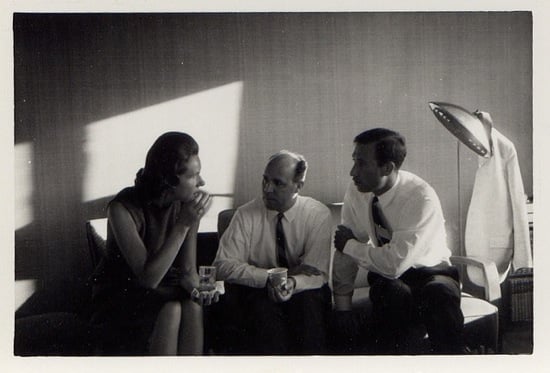
Thanks to Sautet, however, philosophy cafés have been popping up in coffeehouses, bookstores, and other public venues all over the place: in London, Tokyo, San Francisco, Mexico City. In New York, not a town noted for its relaxed café culture, there are at least half a dozen regular cafés-philos, one of which — moderated by Lou Marinoff, author of the much-reviewed self-help book Plato Not Prozac! — meets in a Manhattan Barnes & Noble. (Another, moderated by a Sarah Lawrence professor, meets at the coffeehouse Bamiyian, on Twenty-sixth Street at Third Avenue.) Phillips hadn’t met Sautet when he started his first Socrates Café — in August 1996, in Montclair, New Jersey — and when the two did meet, they were unable to communicate, since Sautet spoke no English and Phillips no French. “Still,” Phillips insists, “we got along very well.” Phillips readily admits that, along with Lipman and Kaufmann, Sautet had certainly been an inspiration. Sautet’s 1995 book about cafés-philos, for instance, is entitled Un Café pour Socrate. Phillips has also completed a book, which will be published by Norton this winter, called Socrates Café. When I mentioned philosopher’s cafés to Phillips, however, he told me he doesn’t consider what he does to have much, if anything, to do with the café-philo phenomenon.
Phillips says he doesn’t like being lumped in with other philosopher’s café facilitators because, despite their claim to be challenging the insider/outsider dichotomy that has plagued philosophical inquiry for so long, “they may be creating and perpetuating a different kind of dichotomy by failing to ask themselves, Where are people? Who can come to cafés, and who can’t?” After his first Socrates Café in Montclair received a write-up in the New York Times, Phillips recounts, he received a phone call from a senior citizen. “He said, ‘I’m eighty-five years old, and I can’t get to Montclair. Can you come here?’ I thought, Gosh, of course I can! and I started going to senior centers, nursing homes, and senior residences. You should see these people’s faces light up when we start discussing a question like What is Good?” he says. “And then I got a letter from an inmate at a jail, which said, ‘I can’t come to a café unless I want to serve another thirty years when they catch me,’ so I started going to jails, too, and this whole thing started to blossom.” Phillips has since facilitated Socrates Cafés in senior centers, assisted-living complexes, prisons, libraries, day-care centers, elementary and high schools, churches, and even universities in Manhattan, Brooklyn, San Francisco, Baltimore, Phoenix, and elsewhere. Phillips applauds the efforts of those who start philosopher’s cafés, but asks, “If these people think what they’re doing is so special, why limit it to people who can come to cafés? That’s just as elitist as doing philosophy in an ivory tower!”

For Phillips, “a lot of people who say they’re using the Socratic method are using it for pernicious ends — for closed, stilted, directive inquiry in which the so-called facilitator is leading the participants to what he has already decided is the conclusion.” Some philosopher’s cafés, he allows, like the one facilitated by Marc Sautet, employ authentically elenchic methods. Most, he insists, ” are run by some professorial type who spews from on high. They say they’re bringing philosophy out of the academy, away from the hierarchy where one person is the philosopher with all the answers and everyone else is just a discussant, but I’m not so sure some of these guys aren’t setting up the same hierarchies, and creating yet another dependency.” (Phillips doesn’t quite use the word “Sophist” to describe the competition, but the word seems to hover over our telephone conversation at this point.) Phillips is attracted to the Socratic method because it opposes itself to any mode of doing philosophy that requires allegiance to a specific philosophical viewpoint, analytic technique, or specialized vocabulary. The reason he decided to call what he does a Socrates Café, he notes, is “because I didn’t want anybody to mistake it for anything else. It’s just Socratic dialogue. A café-philo can be anything under the sun. But I just want people to know that they’re getting straight Socratic method.”
In order to guard against a Socrates Café becoming what he calls “The Chris Phillips Show,” Phillips never chooses the question to be discussed; instead, he asks the group to suggest a number of questions, then has them vote on the question about which, collectively, they “feel least expert and most perplexed.” (He points out that The Society for Philosophical Inquiry is called that because “not everybody is comfortable calling him or herself a philosopher, but — at least for the two really cool hours we’re together — we’re all inquirers.”) Phillips proudly notes that the Socrates Café he started in Montclair goes on every Tuesday night without a hitch, even though he left in 1997. That’s because, although Phillips is always willing to teach others how to facilitate a Socratic dialogue — at last count he’d facilitated over eight hundred Socrates Cafés, in over a hundred venues — he insists that everyone is capable of facilitating a Socratic dialogue. “Some of my best facilitators are people who would never set foot in the hallowed halls of academia,” he boasts. “One of our best facilitators is a thirteen-year-old kid, who’s considered, in school, a special-education child. And another one is a seventy-year-old retired postal worker. He’s brilliant! He’d never read a word of philosophy in his life. Now he’s actually gone back to school and is getting his B.A. in philosophy, which is so cool. He’s a better facilitator than I’ll ever be. I think he’s just beautiful.”

How, exactly, does one facilitate a Socrates Café? Apparently, you just have to keep asking yourself: “What Would Socrates Do?” Remember, Socrates presented himself as a perplexed inquirer who knew only that he knew nothing; by example, he showed that the proper business of the philosopher — and, by extension, a Café Socrates facilitator — is to help us see that we don’t know nearly as much as we think we know. In his book, Phillips writes that when a Socrates Café participant asks an apparently deep question like “How can we overcome alienation?” the facilitator ought to challenge the premise of the question at the outset. “You may need to ask: Is alienation something we always want to overcome?,” he counsels. “For instance, Shakespeare and Goethe may have written their timeless works because they embraced their sense of alienation rather than attempting to escape it. If this was so, then you might want to ask: Are there many different types, and degrees, of alienation? Depending on the context, are there some types that you want to overcome and other types that you do not at all want to overcome but rather want to incorporate into yourself? And to answer effectively such questions, you first need to ask and answer such questions as: What is alienation? What does it mean to overcome alienation? Why would we ever want to overcome alienation? What are some of the many different types of alienation? What are the criteria or traits that link each of these types? Is it possible to be completely alienated? And many more questions besides.”
Does a Socrates Café ever arrive at an answer to their questions? “It’s not about coming up with answers but finding a way to ask the questions, which, in a way, is the answer,” Phillips replies enigmatically. “Those who become smitten with the Socratic method of philosophical inquiry thrive on the question. They never run out of questions, or out of new ways to question. In fact,” he concludes, “some of Socrates Café’s most avid philosophizers are, for me, the question personified.”

READ MORE essays by Joshua Glenn, originally published in: THE BAFFLER | BOSTON GLOBE IDEAS | BRAINIAC | CABINET | FEED | HERMENAUT | HILOBROW | HILOBROW: GENERATIONS | HILOBROW: RADIUM AGE SCIENCE FICTION | HILOBROW: SHOCKING BLOCKING | THE IDLER | IO9 | N+1 | NEW YORK TIMES BOOK REVIEW | SEMIONAUT | SLATE
Joshua Glenn’s books include UNBORED: THE ESSENTIAL FIELD GUIDE TO SERIOUS FUN (with Elizabeth Foy Larsen); and SIGNIFICANT OBJECTS: 100 EXTRAORDINARY STORIES ABOUT ORDINARY THINGS (with Rob Walker).
